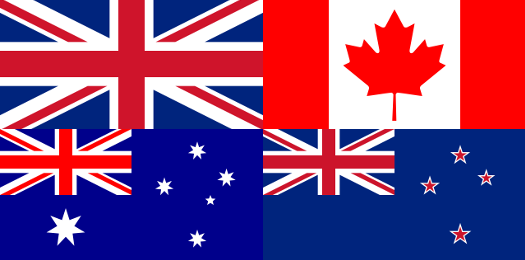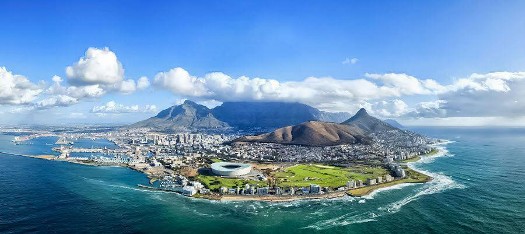 Above, the four flags of what has been called the “Old or “White” Commonwealth. By rights, this should also include South Africa which gained Dominion Status in 1910.
Above, the four flags of what has been called the “Old or “White” Commonwealth. By rights, this should also include South Africa which gained Dominion Status in 1910.
Below is an edited list of the national medal rankings of the Rio Games. Nations are ranked not on their the total medal haul but in order of the numbers of gold medals, then numbers of silver medals and if no gold medals and then numbers of bronze medals if no silver medals. With one exception, we have not included nations that have not won a Gold medal. The exception is Austria that came 78th equal along with a number of other small nations with one Bronze medal. We have included Austria due to Serbia’s splendid performance (given her population size and lack of wealth) at 32nd with 2 Gold Medals, 4 Silver Medals and 2 Bronze Medals.
The reason why we have a compilation image of the four national flags is simple: they all share the same monarch and their total national medal haul as can be seen by the list below comfortably exceeds that of the USA – this with a combined population of around 40% of the USA’s.
1st United States G: 46 S: 37 B: 38 T: 121
-–– The “Old Commonwealth” G: 43 S: 46 B: 47 T: 136
2nd Great Britain G: 27 S: 23 B: 17 T: 67
3rd China G: 26 S: 18 B: 26 T: 70
4th Russia G: 19 S: 18 B: 19 T: 56
5th Germany G: 17 S: 10 B: 15 T: 42
6th Japan G: 12 S: 8 B: 21 T: 41
7th France G: 10 S: 18 B: 14 T: 42
8th South Korea G: 9 S: 3 B: 9 T: 21
9th Italy G: 8 S: 12 B: 8 T: 28
10th Australia G: 8 S: 11 B:10 T: 29
11th Netherlands G: 8 S: 7 B: 4 T: 19
12th Hungary G: 8 S: 3 B: 4 T: 15
13th Brazil G: 7 S: 6 B: 6 T: 19
14th Spain G: 7 S: 4 B: 6 T: 17
15th Kenya G: 6 S: 6 B: 1 T: 13
16th Jamaica G: 6 S: 3 B: 2 T: 11
17th Croatia G: 5 S: 3 B: 2 T: 10
18th Cuba G: 5 S: 2 B: 4 T: 11
19th New Zealand G: 4 S: 9 B: 5 T: 18
20th Canada G: 4 S: 3 B: 15 T: 22
21st Uzbekistan G: 4 S: 2 B: 7 T: 13
22nd Kazakhstan G: 3 S: 5 B: 9 T: 17
23rd Colombia G: 3 S: 2 B: 3 T: 8
24th Switzerland G: 3 S: 2 B: 2 T: 7
25th Iran G: 3 S: 1 B: 4 T: 8
26th Greece G: 3 S: 1 B: 2 T: 6
27th Argentina G: 3 S: 1 B: 0 T: 4
28th Denmark G: 2 S: 6 B: 7 T: 15
29th Sweden G: 2 S: 6 B: 3 T: 11
30th South Africa G: 2 S: 6 B: 2 T: 10
31st Ukraine G: 2 S: 5 B: 4 T: 11
32nd Serbia G: 2 S: 4 B: 2 T: 8
33rd Poland G: 2 S: 3 B: 6 T: 11
34th North Korea G: 2 S: 3 B: 2 T: 7
35th Belgium G: 2 S: 2 B: 2 T: 6
35th Thailand G: 2 S: 2 B: 2 T: 6
37th Slovakia G: 2 S: 2 B: 0 T: 4
38th Georgia G: 2 S: 1 B: 4 T: 7
39th Azerbaijan G: 1 S: 7 B: 10 T: 18
40th Belarus G: 1 S: 4 B: 4 T: 9
41st Turkey G: 1 S: 3 B: 4 T: 8
42nd Armenia G: 1 S: 3 B: 0 T: 4
43rd Czech Republic G: 1 S: 2 B: 7 T: 10
44th Ethiopia G: 1 S: 2 B: 5 T: 8
45th Slovenia G: 1 S: 2 B: 1 T: 4
46th Indonesia G: 1 S: 2 B: 0 T: 3
47th Romania G: 1 S: 1 B: 3 T: 5
48th Bahrain G: 1 S: 1 B: 0 T: 2
48th Vietnam G: 1 S: 1 B: 0 T: 2
50th Taiwan (competes as “Chinese Taipei”) G: 1 S: 0 B: 2 T: 3
51st Bahamas G: 1 S: 0 B: 1 T: 2
51st Côte d’Ivoire G: 1 S: 0 B: 1 T: 2
51st Independent Olympic Athletes G: 1 S: 0 B: 1 T: 2
54th Fiji G: 1 S: 0 B: 0 T: 1
54th Jordan G: 1 S: 0 B: 0 T: 1
54th Kosovo G: 1 S: 0 B: 0 T: 1
54th Puerto Rico (A territory of the USA but competes separately) G: 1 S: 0 B: 0 T: 1
54th Singapore G: 1 B: 0 S: 0 T: 1
54th Tajikistan G: 1 S: 0 B: 0 T: 1
78th Austria G: 0 S: 0 B: 1 T: 1
There is no doubt that Great Britain’s performance is anything other than very impressive. It is of course the result of millions upon millions of lottery money being spent on training these elite sports people in lavishly equipped facilities.
Below are two contrasting reports on the matter.
The Guardian: https://www.theguardian.com/sport/2016/aug/21/great-britain-sporting-superpower-rio-olympic-medal-haul
And an interesting article by Tony Hawks, a comedian and author heavily involved in grass-roots sports charities: http://www.telegraph.co.uk/olympics/2016/08/19/are-team-gb-really-worth-their-weight-in-gold/
British Gazette comment: Our view about Olympic funding has changed since the re-establishing the British Gazette online in October 2009.
This expenditure should be looked at in much the same way as a large multi-national corporation spends a considerable proportion of it’s total advertising budget on advertising nothing in particular. This seeming waste of money is not a waste however. These huge corporations so this to promote a particular corporate image and identity to populations across the world. They do this because it is assessed as ultimately beneficial to the corporation’s bottom line. Such decisions are taken by senior executives most of whom are highly competent individuals not known for throwing money away.
Be in no doubt: Coming second behind the USA and above China in third place as a result raised the international profile of “UK PLC” greatly. Given that we hopefully will exit the EU in the future this is very important!
Three things need to be addressed:
Firstly: The importance of maintaining funding at these levels.
Secondly: An additional aim: to increase GB’s success on track and field – and in particularity track.
This is because “track and field” are the sports that define the Olympics. There is for instance a “sport” called “Rhythmic Gymnastics” – a female participative support and one which GB did not compete in. Such sports are way down this list when it comes to the profile of the Olympics. As such they are of less importance. What the country should be focusing on – in addition to what it already is doing – is to bring on a new generation of track and field stars, in particular in the iconic events such as the 100 metres (or 109 yards, 1 foot and 1 inch as it should be!) as these are the highest profile events internationally. It is what the Olympics are best know for. This means looking at talented individuals in the schools. Results should not be expected in the 2020 games but in the 2024 games – meaning children aged ten who will be eighteen in 2024.
Thirdly: Improving viewer satisfaction. FACT: most Britons looked at the Olympics via the TV. Only a tiny number (relative to the total audience figures) travelled to Rio de Janeiro. A big problem was the difference in Time Zone. It caused many events to be screened when people in the UK were mostly fast asleep!
Addressing this means of course addressing the question of where to hold the Summer Olympics. Given the huge costs involved, it is getting increasingly difficult to find support for such extravagant expenditure in nations that have the money and competence to deliver a good games. We can see that the Brazilians fell down on the job. This is not going happen in 2020 at the Tokyo Olympics. We can rely on the Japanese to do a good job!
At the moment the International Olympic Committee is considering bids from Paris, Rome, Budapest and Los Angeles for the 2024 games.
Let us consider the time zones know. Tokyo is 9 hours ahead of us. Thus events starting at 8:00AM local time will be 4:00PM our time with events at 8:00PM local time 4:00AM our time.
Paris, Rome and Budapest are 1 hour ahead.
Los Angeles is 8 hours behind us.
It is to be hoped the IOC choose a European location.
What the IOC and participating nations should be considering is this: Should there not be a fixed location for the games in one country?
Clearly, this is something the Greek government advocate! Naturally they sate that Athens should be the venue given the history of the games!
There are two problems with this however. The first is climatic. Anybody who has visited Athens in August will be able to attest to the heat! Your Editor speaks from first hand experience! There is always the secondary problem of earthquakes. Greece is in an active seismic zone.
So the question is this: Where should the nations of the world send their athletes every four years?
Well, the location should not be too hot.
A seismic safe area would be a reassuring bonus.
It should be in a populated are in a country that is fairly well established in terms of infrastructure.
The hinterland should be “quite nice” in terms of scenery.
One city in one country fills these requirements: Cape Town, South Africa. Because Cape Town is in the Southern Hemisphere, the seasons are reversed. Cape Town is reasonably OK for doing strenuous activities in August. Cape Town has however one problem. South Africa does not have a lot of money and what it does have needs to be spent on far more important things. This means that the international community should all put their hands in their pockets and provide the finance. If for instance US $10 billion is spread across the members of the G20 then it need not represent a huge bill. The facilities should be owned by a corporate body and could be rented out when the games are not being held.
Cape Town (below) is 2 hours ahead of us.
Speaking the Truth unto the Nation
